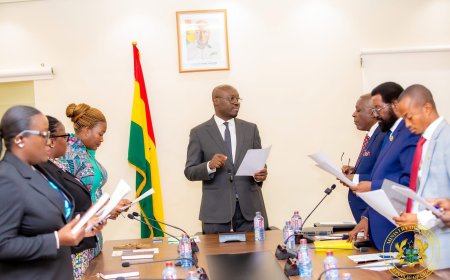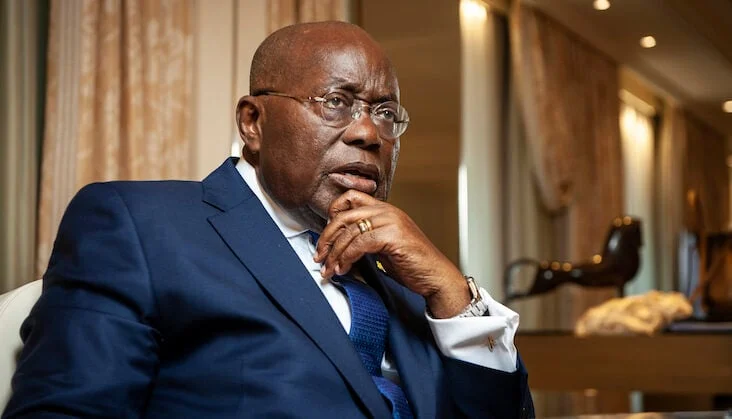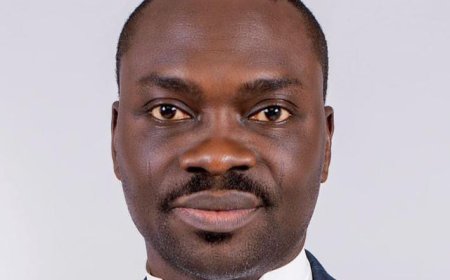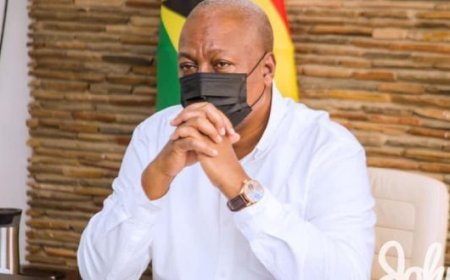Grounding the ”Kotoka Clause”—Why Swearing in an Acting President for Travel Is a Constitutional Folly

In the theatre of Ghanaian constitutional interpretation, few myths have lingered as stubbornly—and as absurdly—as the idea that every time the President and Vice-President travel outside the country, the Speaker must be sworn in as Acting President.
This practice, supposedly grounded in the law, is in fact rooted in a misreading—more precisely, a misapplication—of our constitutional text by the Supreme Court in Asare v. Attorney-General [2003–2004] SCGLR 823.
Let’s be clear: the 1992 Constitution does not require the Speaker of Parliament to be sworn in when the President and Vice-President are both simply outside Ghana. That ritual is not law—it is theatre.
I. The Source of the Confusion: A Vestige from 1969
Article 38(3) of Ghana’s 1969 Constitution reads:
“Whenever the President dies, resigns, is removed from office or is absent from Ghana or is by reason of illness unable to perform the functions of his office, the Speaker of the National Assembly shall perform those functions…”
This provision did, indeed, allow the Speaker to act when the President was simply abroad. But context is key. The 1969 Constitution was modeled on the Westminster system. The President was ceremonial, the Prime Minister held real executive power, and the Speaker—often from the same political party—could step in without triggering institutional tremors. The risk of misuse was negligible.
II. The 1979 and 1992 Shift: Executive Presidency and Constitutional Maturity
In contrast, the 1979 and 1992 Constitutions established an executive presidency. Under this structure, transferring presidential power, especially temporarily, is a matter of national significance, not ceremony. And the constitutional text evolved accordingly.
Article 60(8) of the 1992 Constitution provides:
“Whenever the President is absent from Ghana or is for any other reason unable to perform the functions of his office, the Vice-President shall perform those functions until the President returns or is able to perform them.”
Here, absence from Ghana remains relevant—but only as a trigger for the Vice-President to act. Not the Speaker. Not Parliament. Not anyone else.
Article 60(11), by contrast, states:
“Where the President and the Vice-President are both unable to perform the functions of the President, the Speaker of Parliament shall perform those functions until the President or Vice-President is able to perform those functions or a new President assumes office, as the case may be.”
Crucially, unlike Article 60(8), Article 60(11) drops any reference to “absence from Ghana.”
That omission is intentional and telling. The framers clearly distinguished between “absence from Ghana” and “inability to perform”. The former is routine and expected. The latter is serious—death, resignation, illness, or incapacitation.
III. Justice Date-Bah’s Error: Reading 60(11) as 38(3)
Yet, despite this textual clarity, Justice Date-Bah, under a so-called “purposive interpretation”, argued that absence from Ghana should be treated as “inability to perform” under Article 60(11).
In effect, he asked the courts and rhe country to read the 1992 Constitution as if it were still 1969.
This was a doctrinal detour with no constitutional map. Faced with the fact that the framers of the 1992 Constitution explicitly preserved absence from Ghana in Article 60(8) but excluded it from Article 60(11), Date-Bah pivoted.
He could not rely on subjective purpose, because the framers never intended this absurdity, so he invoked “objective purposive interpretation”: the view of a hypothetical reasonable observer.
But let’s ask: What reasonable person, familiar with separation of powers, executive authority, and constitutional design, would believe that mere travel abroad renders the President and Vice-President unable to govern—and requires a full transfer of power to a Speaker of a different branch of government?
IV. Legal Risk and Institutional Absurdity
This isn’t just bad interpretation—it’s risky governance. As GOGO rightly warned at the time, swearing in a Speaker as Acting President while the elected President and Vice-President are merely airborne creates a constitutional vacuum—and a political opportunity.
What if the Speaker, now “Acting President,” issues an executive order revoking appointments, rescinding treaties, or even declaring the President and VP persona non grata? These may sound extreme, but law is about structure, not just trust. That’s why the Constitution requires both inability and vacancy—not mere travel—for such drastic transitions.
V. The Law Is Clear, Even If the Practice Is Not
Article 60(8): When the President is absent, the Vice-President acts.
Article 60(11): The Speaker acts only when both President and Vice-President are unable—not merely traveling.
There is no clause that says if the President and Vice-President go to Togo, the Speaker gets to play President. There is no “Kotoka clause” in the Constitution. That fiction was manufactured by judicial misinterpretation; not democratic mandate.
Some say “the law is the law.” I say aspirin is aspirin. But expired aspirin—like bad legal interpretation—is dangerous if swallowed.
VI. Conclusion: Restore the Constitution to Its Text
Let’s be honest: Date-Bah’s interpretation was not purposive; it was retrogressive. It substituted ceremonial logic for executive design, ignored the evolution of Ghana’s constitutional structure, and imported expired provisions into a living document.
The time has come to retire the myth of the traveling president’s power vacuum. The Constitution speaks plainly. The Speaker does not act unless both the President and Vice-President are truly unable to govern—not merely out of town.
Let the Constitution breathe. Let the Vice-President act. And let the Speaker stay in his lane, unless the nation truly needs him to cross over.
It is finished.
Da Yie!
Source: Kweku AZAR
























































